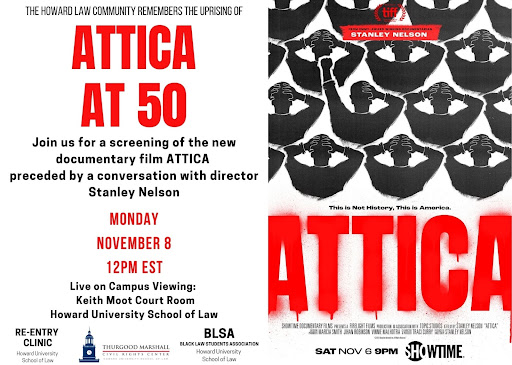
The Howard Law community held a screening of Showtime’s new documentary “Attica” and commemorated the 50th year since the Attica Prison Massacre of September 1971, where 29 inmates and 10 correctional officers of the Attica Correctional Facility in Attica, New York, were executed by state officials after a four-day human rights protest for improved living conditions.
Prior to the showcase, film directors Stanley Nelson Jr. and Traci A. Curry participated in a discussion moderated by CBS reporter, and Pulitzer Prize winning journalist, Wesley Lowery. The event was hosted by Howard University School of Law’s Reentry Clinic, the Thurgood Marshall Civil Rights Center (TMCRC) and Black Law Students Association on Nov. 8, 2021.
Are prisoners human? Do criminals have human rights? Is Blackness metonymy for criminality? Is state sanctioned violence against either civilians or criminals justifiable? These were some of the questions raised after the screening. The documentary humanized inmates at Attica who participated in the protest between Sept. 9-13, 1971.
“Attica” examines a theme of American history: state repression and state violence against marginalized populations parlayed into political opportunities. A collaborative product of Nelson Jr. and Curry over the last two years, the documentary was developed amid police brutality protests and the advent of COVID-19.
Although among the most vulnerable populations affected by the pandemic, prisoners are often underserved and denied basic human rights. Curry believes the production of the film cannot be separated from the period in which it was made.
“When the pandemic started, the last people anyone was concerned about were people in prison. Last year, the previous president used a law enforcement attack on protesters outside the White House as a political opportunity. ‘Attica’ is a reminder of the ways the state will respond with violence to reassert its power. I think we see that clearly in ‘Attica’, and clearly today,” Curry said.
In addition to offering a counter-narrative that provided information directly from former inmates, the film portrayed the social, economic and political context that preceded the inmates’ human rights protest.
“We saw inmates organize into a mini-village or city. Inmates were their own police and ensured correctional officers that were hostages were not harmed, which happened when the state stormed in and shot indiscriminately,” Nkechi Taifa, a Howard University alumna, former professor at Howard School of Law and the founder and CEO of The Taifa Group, a social enterprise firm, said.
Taifa believes Nelson Jr. and Curry’s film demonstrated the inmates’ intelligence and spirit, and will help inform younger generations of America’s history.
“We need to stop burying our history because younger generations need to know about the Atticas, Tulsas, Rosewoods, Wilmington, North Carolinas, the Elaine, Arkansas’, and all these atrocities of Black people and communities,” she explained.
Jy’Mir Starks is an intern for the TMCRC and a second year B.A.-J.D. candidate at Howard who attended the screening. He, too, was impressed by the inmates’ decision-making and honor code.
“I called their behavior carceral communalism because the carceral system and the communalist spirit of the oppressed inmates fused and humanity emerged. Whether the elders of Attica knew or not, they created a functioning society in a place where the state has sanctioned brutality and sentenced them to death,” Starks said.
The Attica Correctional Facility was established in 1931. Attica is known as a prison-town due to the local economy’s dependence on the prison. In 1971, the prison populace was 54% Black, 37% white and 9% Puerto Rican, while the institution’s correctional officers and guards were predominantly white.
The revolt for prisoners’ rights was preceded by inmates’ demands for improved living conditions in July 1971 being ignored by state officials, and the death of George Jackson in San Quentin State Prison in August 1971. The combination of racist and inhumane treatment from Attica’s correctional officers and Jackson’s death catalyzed the inmates’ demonstration for human rights, which began as a hunger strike.
In “Attica”, prisoners designated guards for police hostages and negotiators, developed sleeping quarters, held elections for representatives who had legitimate ideas for prison reform, made numerous demands for improved living conditions and requested amnesty for participation in the protest. Murdered within a month of his scheduled release date, during the state’s attempt to regain control, 21-year old Elliot James “L.D.” Barkley issued clear public declarations about the origin and purpose of the human rights protest.
Curry was proud to provide opportunities for formerly incarcerated elder Black men to showcase their resolve amid systematic terror because, according to her, those people are often silenced. Curry hopes the film helps society discuss uncomfortable dualities, such as the human rights of incarcerated people who have committed crimes.
“In the case of Attica, people were told this massacre is necessary in order to keep law and order. I think the film is an invitation to look at what we are allowing the state to do in our name,” Curry said.
The documentary is available on Showtime for viewers.
Copy edited by Jasper Smith































